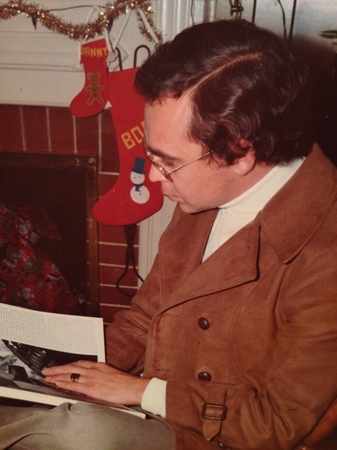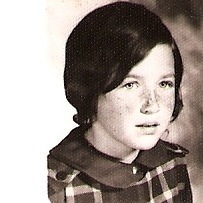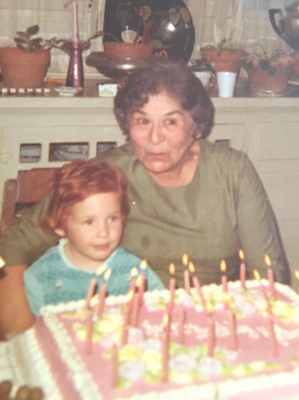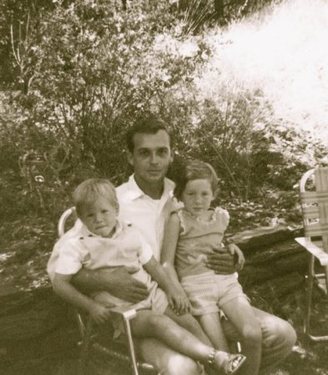When life throws you a 100 mph curve ball, that hits you in the face ... and then another, and another, there are lots of things you can do. If you're a child, set on survival, you block it out and move on.
My father was killed in a car accident when I was 10 -- 42 years ago, June 9th. I've said those first 12 words countless times in my life. It's been a defining detail of my life, and something I wrestled with in endless scenarios in my head, since the morning we heard -- on a cruelly sunny day. I remember the tiniest details of hearing he was dead, with Technicolor precision. And yet, I forgot some of the most important parts ... until two months ago.
Life threw another curve ball 10 weeks ago that brought all those memories back, and has changed everything. Everything -- about who I thought I was, what I thought much of my life was about, how I see the people I've loved, and how I want to live my life from now on. I've spent weeks unscrambling a world of hurt that I've needed to digest and come to terms with -- and accepting that I may never have all the answers I want.
When I was 7, my parents separated. The oldest of their three children, I had a 5-year-old brother and a 2-year-old sister then. I remember my parents arguing; I remember them happy as well. I remember that when they separated my brother and I felt like the world was falling in. I remember living with dad and my great-grandmother, Nini, and feeling very loved, surrounded by people -- grandparents, aunts and uncles, cousins, friends and neighbors, who thought we were the most important people in the world. I felt safe; loved, and important. Times with my mother weren't quite that way, and as young children, we grappled with many of the same things that children of divorce feel as they negotiate two homes and less than ideal circumstances.
My mother took us back east when I was nine. My father delivered us to her apartment, planning to pick us up the next evening. As soon as he drove away, a moving truck picked up all of her things and we boarded a 747 the next day for Massachusetts. I remember my mother told us it was a surprise, and that we shouldn't tell our dad. It all seemed so exciting and surreal to my 9-year-old brain. It never occurred to me that she was taking us without my father's permission; it never occurred to me that I would never see him again.
Suddenly our world was filled with new grandparents, new aunts and uncles, cousins, and neighbors. They loved us and we loved them, but from that day on there was a hole where my father and his family had been. I wondered why dad never called, why he didn't come get us, how he could just let us go. My mother told us that he was a "good daddy, but that he didn't take care of us." She told us that she "had no choice but to take us, so that she could be with her family for support." Over the years, she painted a picture of a classic Peter Pan father who didn't pay child support, wasn't there to care for us, but was good when it came to play time and fun. I knew from the way she spoke, that none of this was good, and while it didn't fit with my own memories of the love and safety I'd felt with him, I too began to describe my father as "a good daddy, but not a good father." I am sure I said those words 100 times through the years. I said them to friends; I said them to my own children. And over time, I buried anything that didn't fit that picture; I forgot that it wasn't true.
Children do not understand the truly devastating things that adults will do when they feel trapped, and my mother spent most of her life feeling trapped. Even the most abused children cling to the parent that abuses them. They try to be perfect and hope that they will be loved and valued. While I wasn't the "most abused child," things were not good, and I knew that I needed to believe whatever my mother told me, to win her approval. I knew that things seemed much less stable with my mom, that my role went from child to co-parent overnight, and that our father didn't want us anymore -- but most of all, I knew that I needed to believe whatever my mother told me.
And so I accepted that my father had moved on -- that maybe there were other children he loved now. I came to believe that the magical times I remembered with him and his family were figments of a young and wishful mind. When he was killed in a car accident a year later, I grieved -- inside everything felt black and empty -- but I grew up accepting my mother's version of him.
Throughout my life I've struggled with confusing memories, and details that never added up. In describing time, the years didn't fit with the memories; the math was all screwy. This seemed really strange coming from a person who has such vivid memories of so many -- extremely detailed memories of so much of my childhood ... with my father. And that's just it, I've always lacked memories of my mother. Before my father's death, there were none, for long stretches, and that didn't fit with the stories she told me, and that I accepted.
Two months ago, my father's sisters set it all straight, and I've been unraveling the shock ever since.
My mother abandoned us. She left me and my two small siblings, alone in an apartment, for my father to find, and then she disappeared for 16 months. No calls to check on us, no visits for birthdays, nothing. She simply disappeared, and my father raised us with my great grandmother and his family. They celebrated our birthdays, took us to school, and loved us. They never spoke ill of my mother to us; they circled the wagons and made sure we knew we were safe and loved.
Still, I was old enough to know that something horrible had happened. Each night I lay awake, hyper-vigilant and afraid that my dad, my great-grandmother, and maybe even my siblings would vanish too. I checked each one as they slept. I sat by the curb in the day, waiting, but my mom didn't come. We all worked on getting beyond that curve ball. We rubbed our bruises and worked on healing.
The day she took us was the first time we'd seen her in at least 16 months. I've always remembered how wary I felt with her when my father drove away that day -- again, viscerally clear in my memory. For most of my life I've felt guilty for that; for being scared when we got on that plane, and when we met all those new family members. I felt guilty for not trusting my mother, most of my life. And yet, I forgot why. The trauma of her abandonment and then my father's death left me clinging to her version of things, completely burying all that had happened in those critical months when she left us behind. When the words came out of my aunt's mouth "what else would your dad have done -- your mother abandoned you for nearly two years!" it all came crashing back -- every missing memory, every dark detail; the math suddenly added up again. I had no memories of my mother for so long because she wasn't there.
In the two months since all of this came out, I've struggled to come to terms with all of the implications and realities of this shocking truth. My father never abandoned us; my mother did. He wasn't a careless father, or a man who didn't pay child support. He wasn't a Peter Pan caricature who moved on when his wife stole his children; he called and he searched. He was a man who "was never the same, from the minute he went to pick his children up and found an empty apartment." He was "devastated when he couldn't find them for five months," because his wife's parents denied knowing where they were. He grieved every single day, and worked to get his children back, at a time when jumping on a plane was a monumental feat. He never forgot them; he mourned their absence each day, and worked to save the money to see his children again.
My father was killed two weeks before a scheduled visit back east, to finally see us. Is there a crueler irony? We were so excited that he was coming; now I am haunted by what that probably meant to him. I believed my mother's story that they were going to try and fix their marriage; I've clung to that romantic vision. Now I believe his only intention was to get us back. I've dug in those sad places and asked questions. I'm searching for truths. I've spent these weeks remembering every detail that has been buried for so long, and talking to other people who remember.
I remember that my father loved us. He took good care of us -- working long hours and living with his grandmother, in order to give his three young children a safe and loving home. We had a garden we played in. We had dinners with my dad and Nini each night, where we were expected to have good manners and eat every bite. There were boundaries and a safe rhythm to our lives. Baths at night, and long bike rides on sunny days. There were strawberries we planted together and picked in the spring. We walked to school with our friends, with lunches packed for us. We were loved, and cared for.
This Father's Day I'm missing that father who took such good care of us, who loved us so much, and lost us. I'm missing the father I lost through death and stories. I'm asking forgiveness for believing what I always knew wasn't true. I'm grieving a daddy that was all of the wonderful things I tried to forget, to not feel the pain of losing him.
I'm letting go of the stories my mother told me because I don't need to believe lies anymore. I'm not interested in demonizing her. She was a broken person, who struggled all of her life. I've always known that. We did our healing before she died, and I loved her. But, what she did was horrible. She took us from our father geographically, and then filled our heads with stories that took him away from us on a much deeper level. I've spent 42 years trying to add things up that didn't add up, and afraid to trust my own gut and instincts -- because all those years ago I learned that survival depended on believing what I knew wasn't true.
This Father's Day I'm reclaiming my own memories and embracing them. There are so many parents who, in doing what they think is right, leave scarred children in their wake. I'm sorry my mother was so lost and scarred, herself, that she didn't think about how her decisions and lies would leave me the same way. She struggled with her own demons. I understand, but it's hard to forgive it. But I am not my mother. I'm living with truth now.
I was a child whose father loved her very much; I'm a woman who remembers that.
If words could make wishes come true... Dad, this one's for you.
https://www.youtube.com/watch?v=1sQ7cuYgjzw
"I've been afraid of changing, because I built my life around you. But time makes you bolder; children get older ... and I'm getting older too."
* * *
If you enjoyed this post: Hit the little thumbs up at the top; it makes me smile. Like it; Share it (we all learned that in kindergarten). If you'd like to read more of my work, check out my blog Tales From the Motherland, or follow me on Twitter and Facebook.
Earlier on Huff/Post50:




